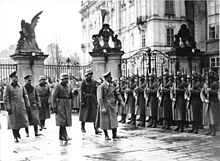Czech Republic–Germany relations
You can help expand this article with text translated from the corresponding article in German. (July 2022) Click [show] for important translation instructions.
|
 | |
Czech Republic |
Germany |
|---|---|
Czech–German relations are the relationship between
Country comparison
| Official name | Czech Republic | Federal Republic of Germany |
|---|---|---|
| Common name | Czechia | Germany |
Flag
|

|

|
Coat of arms
|

| |
| Kde domov můj (Czech) |
"Deutschlandlied"[a] | |
Population |
10,649,800 | 84,432,670 |
| 78,866 km2 (30,450 sq mi) | 357,600 km2 (138,100 sq mi) | |
| 134/km2 (347.1/sq mi) | 232/km2 (600.9/sq mi) | |
UTC+1 (CET)
| ||
Government
|
Unitary parliamentary constitutional republic | Federal parliamentary republic |
Capital & largest city
|
||
Official language
|
Czech | German |
First leader
|
Bořivoj I, Duke of Bohemia (867–889, traditionally)
Václav Havel (1936-2011, current constitution) |
Francis I (1815-1835, traditionally)
Richard von Weizsäcker (1920-2015, current constitution) |
Current head of government
|
Prime Minister Petr Fiala (ODS; 2021–present) | Chancellor Olaf Scholz(2021-present) |
Current head of state
|
President Petr Pavel (2023–present) | President Frank-Walter Steinmeier 2019–present) |
| $261.732 billion
$24,569 per capita |
$4.309 trillion
$51,384 per capita | |
| $432.346 billion
$40,586 per capita |
$5.546 trillion
$66,132 per capita | |
| Czech koruna (Kč) – CZK | Euro (€) – EUR | |
| 0.891 (very high) - 2017 | 0.942 (very high) - 2021 | |
Expatriates
|
21,267 Germans in the Czech Republic | 503,000 Czechs in Germany
|
Background
Bohemia and Moravia (now in the Czech Republic) were settled in the 6th century by

After
At the end of the war, as part of the
Modern relations
After the end of the Cold War, relations warmed between the newly-reunified
Relations with the Free State of Bavaria
In December 2010 and November 2011,
On December 4, 2014, the Minister-President Horst Seehofer opened the Representation of the Free State of Bavaria in the Czech Republic. Among the guests of the opening ceremony were the Czech Prime Minister Bohuslav Sobotka and many Czech and Bavarian ministers. In his speech, Seehofer praised the establishment of a Bavarian Representation in the Czech Republic as a symbol of the growing friendship between Bavaria and the Czech Republic and for a common Europe. The Bavarian Representation should be a place for dialogue, friendship and cooperation.[5]
Education

The Deutsche Schule Prag is a German international school in Prague.
See also
- Germans in Czechoslovakia (1918–1938)
- Expulsion of Germans from Czechoslovakia
- Beneš decrees
- Germans in the Czech Republic
- Austro-German relations
- German-Polish relations
- Foreign relations of Czech Republic
- Foreign relations of Germany
Notes
References
- ^ "Repräsentation und Integration" (in German). Bundespräsidialamt. Archived from the original on 7 March 2016. Retrieved 8 March 2016.
- ^ German-Czech relations positive despite the past
- ^ LN: Gauck's gesture means huge leap in Czech-German relations Archived 2014-05-06 at the Wayback Machine
- ^ "ZEIT ONLINE | Lesen Sie zeit.de mit Werbung oder im PUR-Abo. Sie haben die Wahl".
- ^ "Bayern in Prag – Bayerisches Landesportal".
References to Books
- Detlef Brandes and Václav Kural (eds.): Der Weg in die Katastrophe. Deutsch-tschechoslowakische Beziehungen 1938–1947. Klartext, Essen 1994, 255 pp.
- Václav Kural: Konflikt anstatt Gemeinschaft? Tschechen und Deutsche im tschechoslowakischen Staat (1918–1938). Ústav mezinárodních vztahů, Praha 2001, 359 pp.
- Václav Kural: Místo společenství konflikt. Češi a Němci ve Velkoněmecké říši a cesta k odsunu (1938–1945). Ústav mezinárodních vztahů, Praha 1994, 296 pp.
External links
- German Federal Foreign Office about relations with the Czech Republic
- German embassy in Prague (in Czech and German only)
- Czech embassy in Berlin (in Czech and German only)
- Czech general consulate in Bonn (in Czech and German only)
- Czech general consulate in Dresden (in Czech and German only)
- Czech general consulate in Munich (in Czech and German only)



